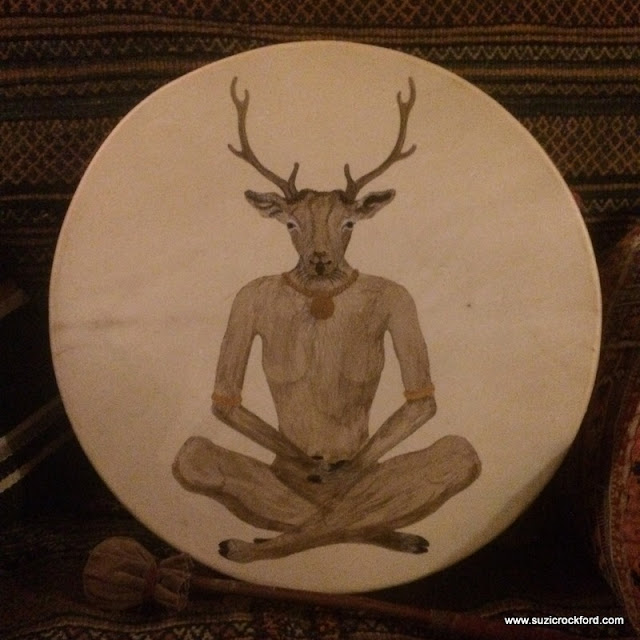I've been seeing a lot of deeply beautiful posts from friends who are using this strange time to drop away from all social contacts, including social media, to go and sit with the land and listen deeply to what She is saying... to what we, the interwoven web of all of life, are saying. This fills my heart with gratitude and hope, and also with a terrible sadness for all those who don't have the opportunity to be with land. There are too many of us cut off from our birthright of conscious connectivity to, and experience of; soft brown earth, freshly unfurling leaves, the scent of the fox who passed in the night hanging on the morning air, the mellifluous arias of birds, or the bubbling songs of rivers.
I cannot bring you scent or sound, but I can offer you sight of the deep green beauty within which I dwell, in the hopes that it feeds your soul. So I'm offering out images of my little corner of what matters. Of Mater, Mother, Gaia, Our Lady of Life.
For those with no access to the healing beauty of the wild right now - a daily dose of Dartmoor will be offered for the rest of Lockdown on my Instagram and Facebook accounts.
This ancient tree-sister, curves a smile through the misty dawn air - she tells me her robe of living green moss delights her. Moss squirms with joy at the appreciation. The many languages of the land are spells that open hearts. They are the key that unlocks the door in our mind between ‘them’ and ‘us’.
Spring’s ululations are on the tip of her own tongue, the returning green erupting, spiraling into new life. Glory to the Land, exultations to Her in her beauty for all she offers us. May we sing her back her own praises with joy at the nearness of this.
Before I take each picture I ask if it's OK that I do so, they smile and give assent. I ask if they will help me with the words, and they tell me they do, and they laugh at me with their moss beaks and their swinging tree hips, they laugh and tell me that everything I need to know, everything I need to say, is held inside my love for them and their love for me.
We have to fall in love with the wild, we must, and in order to fall in love with it we must know it. Not just know its existence, but truly know it like we know our own grandmother, our own sister, our own mother. If we do not fall in love with the wild then we will not save it and we will live in a technical world full of technical details and bot bees fertilizing drone planted genetically modified mono-crops. Cars that fly and drive themselves, instant internet connection, things that seem so appealing, so beguiling, we have them at the cost of the wild, externally and internally. I do not want that, I do not want it for me, or for you, or for any of our children. If we lose this then we lose being human.We will become some other thing, some profoundly frightening thing, half animal, half machine. I suspect the part that is machine will be at lest half of our heart, half of our joy, half of our capacity to grieve. And whilst it's tempting to desire numbness - Oh my Goddess, the beauty that it excludes. It's not worth it.
While we are being separated from the rest of humanity we have an opportunity to experience the truth that we belong to a greater tribe of living, breathing, animate, ensouled beings. We can drop into the arms of the sensual world, realign ourselves with nature and remember our kinship with the rest of life.
So let’s become Ivy, practice flight, flower as shamelessly as a primrose. Eros is not exclusively the dominion of human body touching human body. Eros is our relationship with the sensual world, with all of the rest of matter: These are times when we can't just walk up to our friend and casually cuddle them, feel the beauty and strength of a loving pair of arms around us, no matter how brief or seemingly un-erotic this is, it's a thing that our physicality needs and it's a thing our bodies will miss desperately as it becomes rarer and rarer. So let’s hug a tree, stroke a flower, offer ourselves to the tiny feet of the humble honey bee.
Allow the softly warming air, the wind, the rain, the sun to caress us. Allow the ground to hold us and the water to trickle over our skin. Smell everything, listen hard. We can remember that we are sensual beings, that we are here to derive and imbibe and offer sensuality and mutuality to the living, breathing, animate world, of which we are a part. Ours is an animal body and animal bodies need touching and stroking and celebrating through the senses just as much as they need feeding and watering and sheltering from storms.






































